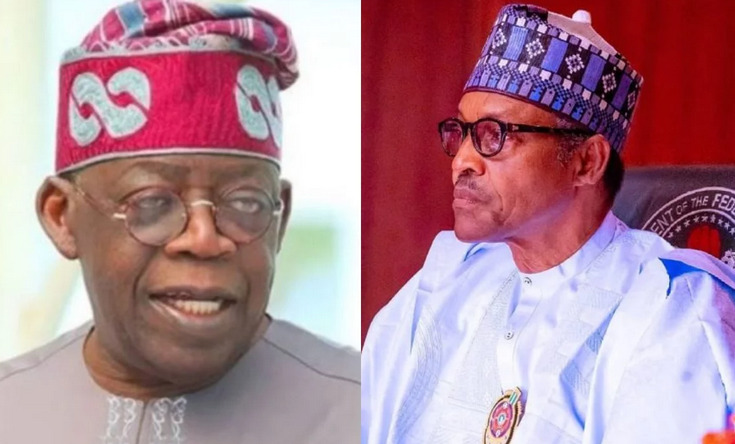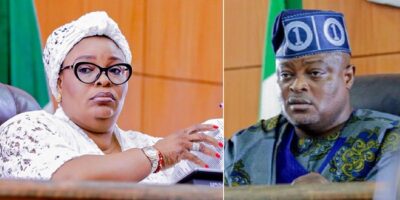May 29th Handover: Concerns As Buhari Govt Pass On N46trn Debts To Tinubu

President Muhammadu Buhari would pass on the N46.25 trillion debt burden to the incoming government.
According to the Debt Management Office, DMO, Nigeria’s total debt stock has hit 46 trillion.
DAILY POST reports that despite the dust already caused by the heavy existing debt burden, the government said it had received approval from the World Bank on another N369 billion loan ahead of the fuel subsidy removal in June 2023.
In the eight years of the Buhari administration, Nigeria’s debt profile had grown from N12.6 trillion in 2015 to over N46 trillion in 2023.
The situation has continued to raise fiscal worries, especially as the International Monetary Fund, IMF, said Nigeria almost emptied its treasury on debt servicing in 2022.
The Federal Inland Revenue said it collected N10 trillion in revenue in 2022, with a 2023 budget expenditure of N21.83 trillion pegged on deficits of N11.34 trillion.
The issue of debt sustainability and economic instability currently chokes Nigeria without hope.
On this ground, the onerous task of surmounting the country’s economic challenges would be shouldered by Tinubu after his swearing-in on May 29, 2023.
However, economic experts said fixing Nigeria’s debt-burdened economy would be a hard nut to crack.
Speaking with DAILY POST on Monday, Prof. Bongo Adi, a Professor of Economics at Lagos Business School said the debt incurred by Buhari’s government had mortgaged the future of the country through heavy obligations.
According to him, the coming days would be difficult for the Nigerian economy because Buhari has left the country broke.
However, he suggested that the only viable option is for the incoming government to seek loan renegotiation, as it is the practice internationally, provided the government has credibility.
“With such a colossal debt burden without apparent means of repayment, the already unsustainable debt profile undermines fiscal sustainability, no matter what the next government will do.
“There is another borrowing spree of $800 million from the Word Bank without how to pay back.
“They are taking advantage of borrowing to share among themself as they want to exit because they know that nobody would hold them to account.
“There is nothing else to talk about; Nigeria is broke. The coming days are not going to be nice at all. Because if you look at the horizon with this kind of debt, we are not bleeding only from the financial side but all ramifications.
“Medical doctors and professionals of all cadres are leaving, so who will create the money to pay back the loans? The factors that drive economic activities are fast depleting.
“So when they go on accumulating loans, they endanger the lives of everybody. Based on the way it is, today’s situation is better than what we will see in the incoming days. They are handing over a dead economy to Tinubu, and I don’t know which magic he would perform.
“The World Bank’s advice has never helped Nigeria or a developing country. There is nothing they would tell you that will work.
“The only thing I can tell you is to renegotiate our debts; however, for anyone to listen, there must be credibility. Now will the incoming government assemble credible individuals?
“The most important thing is to give young Nigerians hope to stay in the country, but then you have to stabilise the economy and security. Every country invests in the youth, but that is not the situation in Nigeria, so who would grow the economy? The priority of the coming government should be how to find creative ways to assure the youths of hope in Nigeria”, he stated.
Also, Dr Ayo Teriba, an economic expert and the Chief Executive Officer of the Economic Associates, said the error of Buhari’s government was not to transition from income-based debt management into an asset-based debt management model.
He disclosed that to ensure sustainability, the incoming government must learn from the mistake of Buhari’s government by borrowing against assets, not income.
He said this was what Brazil and India did that attracted Foreign Direct investment into their countries.
He called on Nigerians to support the call for the incoming government to focus on equity financing rather than debt to grow the economy.
“The current administration will be eight years in about five weeks; the error of omission they committed is not transiting from the income-based model of debt management to the asset-based model of debt management.
“They replaced the government that enjoyed an income boom from commodity prices. An annual average oil price per barrel had been way below $100pb, but the Buhari economy faced declining revenue.
“It continued borrowing such that towards the end of the administration, debt cost rose as high as the revenue. It is threatening the fiscal outlook of the country that by the time you pay interest on them, you won’t have anything left.
“The Buhari administration would have changed our borrowing model but did not because they kept hoping the oil price would increase.
“The incoming government has learnt a lot from the mistakes of Buhari. Going forward, the incoming should borrow against assets, not against income. For example, Saudi Arabia and Malaysia did the same thing.
“I expect the incoming administration will not issue the same instrument as Buhari’s government did.
“Nigeria should move to asset-based borrowing, in the process, unlock revenue for both investors. Nigeria has options: the country is blessed with a lot of assets.
“Instead of issuing debt, equity should be issued; I don’t see why Nigeria cannot attract equity. Nigeria’s prospect of attracting equity is brighter than that of India and Brazil. The clarion call is for Nigerians to support the incoming government to transit to equity issuance. Nigeria’s potential of issuing equity is greater than that of debt”, he stated.
From another perspective, the CEO of SD & D Capital Management, Mr Idakolo Gbolade said the incoming government must be ready for serious business because much damage has been done to Nigeria’s economy.
He stressed that Tinubu’s government must devise creative means to gear up the country’s revenue capacity.
“The incoming government should by now know that they are coming for serious business, and their handling of our loan portfolio in the next six months after inauguration will be one of defining moments in the administration.
“Apart from the world bank loan of $800 million, the out-going government had also planned to use additional loans to fund the 2023 budget.
“The new government needs to devise ingenious ideas to avoid a debt trap similar to Kenya by ensuring that urgent measures are implemented to increase revenue and cut waste.
“The government must reach out to significant lenders like China to readjust repayment terms so that funds to be freed up will be used for targeted infrastructures that can generate additional revenue.
“The incoming government should also critically look at CBN policy measures aimed at curbing inflation to adjust it to reality on the ground.
“Proactive measures must be taken to shore up our oil and gas revenue, and we must renew confidence in our trading partners with assurances that we can fulfill our obligations.
“Issues like subsidy removal and palliative must be adequately spelt out, and accountability must be on the front burner going forward.
“Revenue-generating agencies of government should be audited with a view to producing better performance and surpassing set targets.
“Nigeria has huge untapped economic opportunities and resources which must be explored for the betterment of the people”, he stated.

Justin Nwosu is the founder and publisher of Flavision. His core interest is in writing unbiased news about Nigeria in particular and Africa in general. He’s a strong adherent of investigative journalism, with a bent on exposing corruption, abuse of power and societal ills.













